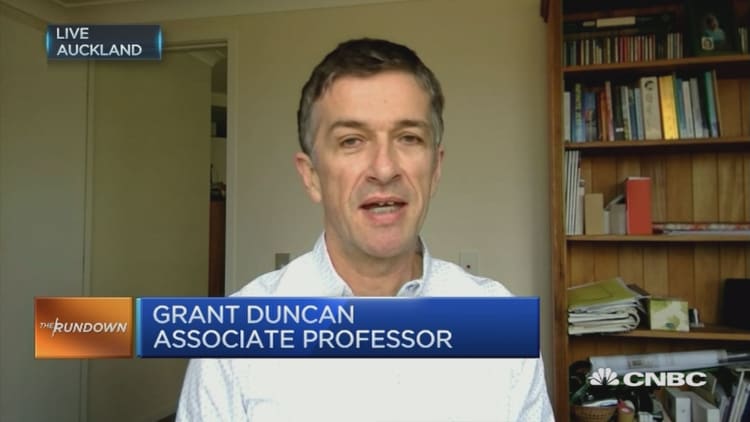New Zealand's ruling National Party could see a short-term dent in its popularity as the public assess the leadership of newly sworn-in Prime Minister Bill English before next year's general election, experts told CNBC on Monday.
English, who previously served as the finance minister, was sworn in on Dec. 12 as New Zealand's 39th prime minister, after the National Party voted him to power at a special meeting. He replaced outgoing prime minister and National Party leader John Key, who had unexpectedly resigned last week despite his popularity among the New Zealand public.
"A lot of people who voted for National in the past have essentially seen themselves as voting for John Key," Grant Duncan, an associate professor at Massey University, told CNBC's "The Rundown."
Entering uneasy alliances in parliament
Despite New Zealand's long history of political stability, some commentators believe the change in leadership in the ruling National Party right before the general election could potentially loosen its dominance in parliament.
Stephen Hoadley, an associate professor of politics at the University of Auckland, told CNBC's "Squawk Box" while it could emerge victorious in the polls next year, its margin of win would be much smaller. "It may require coalition partners," Hoadley said, adding it might have to turn to the conservative New Zealand First party.
New Zealand follows a parliamentary system in which the public votes for a local member of parliament and also for their preferred political party - as a result, political parties are represented in parliament proportionally according to the number of votes they received.

English will have less than a year to establish his credentials before the country heads to the polls in 2017, but a date has not yet been set.
Duncan added however it was unlikely English would call for a snap election and that the 2017 budget presentation mid-year would provide an opportunity for the new leadership to establish its policy aims.
English lined up the minister for economic development, Steven Joyce, to replace him in the finance ministry, while social housing minister, Paula Bennett, was named deputy leader of National Party, reported Reuters.
Banking on New Zealand's strong economy
English has been closely involved in policy-making in the Key government, having served as deputy prime minister and finance minister. The consensus among commentators is that he is unlikely to make any drastic u-turns on policies.
"The policy tilt looks set to be less about tax cuts and more about reducing debt and lifting priority spending (in education, housing and infrastructure)," wrote Cameron Bagrie, chief economist for New Zealand at ANZ, in a research note on Friday. Bagrie said government accounts were in good shape to support fiscal initiatives.
The NZX 50 index eased slightly on Monday, down 0.22 percent to 6,877.92 after the announcement, while the traded marginally higher at 82.31 against the dollar.
In its half year economic and fiscal update released Thursday, New Zealand's Treasury projected government's underlying surplus to rise to 8.5 billion New Zealand dollars ($6.07 billion) by 2021 and net debt to fall below 20 percent of gross domestic product (GDP).

For fiscal 2016, the government downgraded its budget surplus estimate from NZ$1 billion to NZ$473 million as a result of costs related to a devastating earthquake in November, reported Reuters.
The projected fiscal surplus would give English cash to put into infrastructure spending, according to Hoadley. He said the new government had to improve the ability of the New Zealand commercial sector to carry on its business and rebuild Christchurch, as well as the recent earth-quake-damaged Wellington.
Growth has also been resilient in the country; in the June 2016 quarter, the economy grew 3.6 percent on-year. By comparison, OECD's on-year growth for the same quarter was only 1.6 percent. Data for the September 2016 quarter in New Zealand was due on Dec. 22.
ANZ's Bagrie expected English's government to also discuss the long-term sustainability of New Zealand's national pension scheme.
The New Zealand Superannuation makes fortnightly payments to people aged 65 and above. Former PM Key had promised to resign if the government raised the age of eligibility for superannuation, according to Radio New Zealand. English, in his first press conference as PM, did not make the same pledge.
There were several other issues that English would inherit from Key, according to Hoadley. These include insufficient supply and high prices for housing, very little wage growth and rising wage inequality and the imminent failure of the Trans-Pacific Partnership agreement the National party had championed.


